Search Results
Showing results 1 to 20 of 34

Build a Solar System
Source Institutions
In this activity, learners make a scale model of the Solar System and learn the real definition of "space." Learners use the online calculator to create an appropriate scale to use as a basis for thei

Hanging Around
Learners investigate weight by building a spring scale. They observe and record how it responds to objects with different masses.
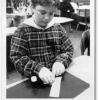
Cylinders and Scale
Source Institutions
In this activity, learners investigate the relative growth of lengths, areas, and volumes as cylinders are scaled up.

A Question of Balance
Source Institutions
In this activity, learners explore how engineers use scales and measures when designing a manufacturing process to ensure that final products are uniform in weight or count.
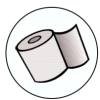
Toilet Paper Solar System
Source Institutions
In this activity, learners build a scale model of the solar system using a roll of toilet paper.

Does Size Make a Difference?
Source Institutions
In this activity on page 15 of the PDF, discover how materials and physical forces behave differently at the nanoscale.
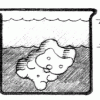
Gummy Growth
Source Institutions
In this activity related to Archimedes' Principle, learners use water displacement to compare the volume of an expanded gummy bear with a gummy bear in its original condition.
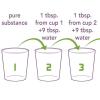
Sniffing for a Billionth
Source Institutions
This is an activity (located on page 4 of the PDF under What's Nano? Activity) about size and scale.

Pea Brain!: Explorations in Estimation
Source Institutions
In this activity, learners use two different techniques to estimate how many little things fit into one bigger thing.
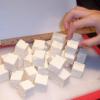
Exploring at the Nanoscale
Source Institutions
This lesson focuses on how nanotechnology has impacted our society and how engineers have learned to explore the world at the nanoscale.

Animals are Amazing!
Source Institutions
In this activity, learners use measurement concepts to make models of what their body parts might look like if they were a snake or a chameleon.
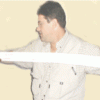
Personal Time Line
Source Institutions
In this activity, learners work in groups to create a time line representing significant moments in their lives.

Solar System Bead Distance
Source Institutions
In this astronomy activity, learners create a model of the solar system using beads and string.
Stack-o-Pennies Shop
Source Institutions
In this math activity, learners pretend there is a special store that lets you pay for toys by their height in pennies.

Leaning Tower of Pasta
Learners build structures from spaghetti and marshmallows to determine which structures are able to handle the greatest load.
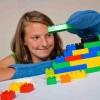
Exploring Tools: Mitten Challenge
Source Institutions
In this activity, learners build a LEGO® structure while wearing mittens. This activity shows learners how difficult it is to build small things when your tools are too big.

What am I?
Source Institutions
In this activity, learners examine nanoscale structures of common things.
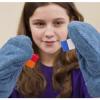
Mitten Challenge
Source Institutions
In this activity, learners try to put together toy bricks—wearing oven mitts on their hands! This activity shows learners how difficult it is to build small things when your tools are too big.

Cleaning Air with Balloons
Learners observe a simple balloon model of an electrostatic precipitator. These devices are used for pollutant recovery in cleaning industrial air pollution.
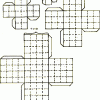
Modeling Limits to Cell Size
Source Institutions
This investigation provides learners with a hands-on activity that simulates the changing relationship of surface areas-to-volume for a growing cell.
